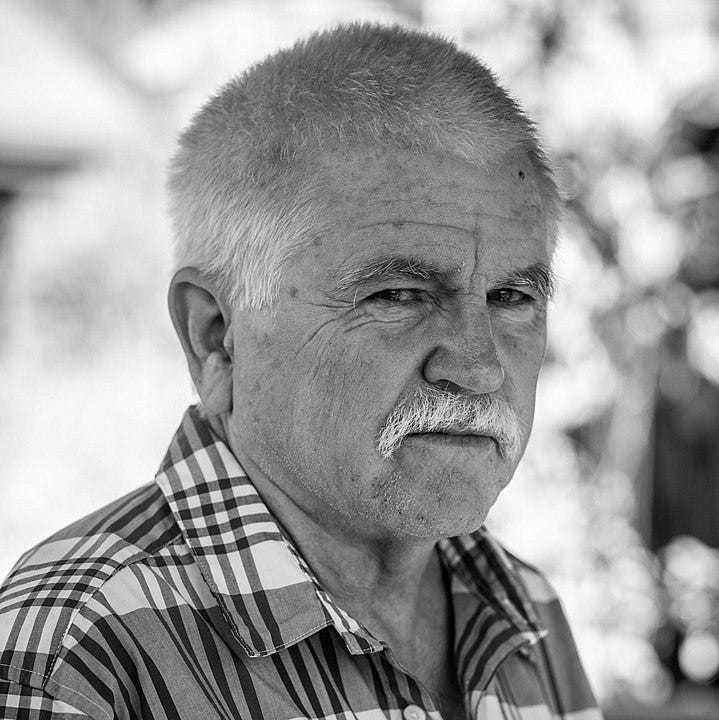28 October 2022. Economics | Mike Davis
How Britain became a poor country // In memory of Mike Davis and a wider view of the present
Welcome to Just Two Things, which I try to publish three days a week. Some links may also appear on my blog from time to time. Links to the main articles are in cross-heads as well as the story. A reminder that if you don’t see Just Two Things in your inbox, it might have been routed to your spam filter. Comments are open—and have a good weekend.
1: How Britain became a poor country
There’s something going on when you see similar articles on the long-run trends in the British economy in both The Atlantic and Novara Media.
At The Atlantic Derek Thomson sets out to explain how Britain became one of the poorest countries in Western Europe. The article’s standfirst spells out the reasons succinctly:
Britain chose finance over industry, austerity over investment, and a closed economy over openness to the world.
Thompson, who’s an American journalist writing for an American magazine, realises that the notion that Britain is getting poorer might need some explaining to his audience, so he spells it out early on:
(S)trictly by the numbers, Britain is pretty poor for a rich place. U.K. living standards and wages have fallen significantly behind those of Western Europe. By some measures, in fact, real wages in the U.K. are lower than they were 15 years ago, and will likely be even lower next year.
(Chris Beckett, Detail from a poster for Maggie's End (2009), Shaw Theatre, Euston Road, London. CC BY-NC-ND 2.0)
He traces the story back to the ‘70s, when by his account a post-imperial anxiety about national economic performance allowed Thatcher to both wreck the unions and deregulate the economy, and especially the City of London. (He misses the bit about joining the EEC, as it was then, in the 1970s, precisely to connect Britain to faster-growing economies in Europe, and the role of oil revenues in paying for all of this.)
Anyway:
Britain, which got rich as the world’s factory in the 19th century, had become the world’s banker by the 21st.
That all worked well until the financial crisis of 2008, when the wheels came off. Actually, the wheels were coming off some time before that, if the investment numbers are to be believed, which is what happens if you strike a Faustian bargain with the finance sector:
Although British media worry about robots taking everybody’s jobs, the reality is closer to the opposite. “Between 2003 and 2018, the number of automatic-roller car washes (that is, robots washing your car) declined by 50 percent, while the number of hand car washes (that is, men with buckets) increased by 50 percent,” the economist commentator Duncan Weldon told me in an interview for my podcast, Plain English. “It’s more like the people are taking the robots’ jobs.”
There is something resonant about this car washing story as a metaphor—I used it here a few weeks ago when writing about the Conservative Party’s long crisis. One of the reasons for this is that it captures a deep truth about the British economy:
According to the International Federation of Robotics, the U.K. manufacturing industry has less technological automation than just about any other similarly rich country. With barely 100 installed robots per 10,000 manufacturing workers in 2020 , its average robot density was below that of Slovenia and Slovakia… Thus, the U.K., the first nation to industrialize, was also the first to deindustrialize.
There’s a bit of American-ness here on the British left that I didn’t recognise, where Thompson says, “On the academic left, the U.K. has lately been home to a surging movement called degrowtherism, which asserts that saving the planet requires rich countries to stop seeking growth.” I don’t recognise this because it confuses growth with productivity. I don’t know anyone on the left who doesn’t understand that you only get better quality work and jobs through investment and productivity. (Most of France and Germany’s productivity gains over two decades have been ‘spent’ on quietly reducing working hours.)
But the article does note the oddness of a political system where the ruling party rests on the votes of retired people:
“In 2019, when Boris Johnson and the Conservative Party won a big majority in the House of Commons, most people of working age did not vote for them,” (economist Duncan) Weldon told me. “I’m pretty sure that’s the first time that’s ever happened. You have this post-economic, older, economically insulated voting bloc that could afford to be anti-growth almost as a luxury, because they don’t have to care about economic outcomes.”
And with all of that Britain became a cautionary tales:
The U.K. is now an object lesson for other countries dealing with a dark triad of deindustrialization, degrowth, and denigration of foreigners. Having offshored industry in favor of finance, its economy wasn’t resilient. The resulting erosion in living standards made the public desperate for something to blame. Blame-seeking conservatives spotted bogeymen abroad. Brexit cut off the economy from further growth and set the stage for a rolling political circus.
The question this opens up for Aaron Bastani on Novara Media is how to manage liberal democracies without growth.
For the whole of Britain’s democratic era economic growth has provided the revenues for one of the major parties to reward their respective constituencies, and thereby generate political consent... For the Tories, growth meant tax cuts. For Labour, it was the basis for post-war social democracy and, under Tony Blair, huge infusions of cash into schools and hospitals. That this is no longer possible is at the root of present Conservative despondency.
Bastani sees the combination of low growth, high inflation, and adversarial politics as meaning that Britain’s dysfunctional politics is likely to continue. His conclusion, from the left, is that this means we need a politics that combines both basic competence as well as new economic ideas. If that seems radical, the alternatives are worse:
It doesn’t matter if a talented bureaucrat oversees a dysfunctional system failing to deliver. Just look at the final years of the Austro-Hungarian Empire, which disintegrated in the face of competing nationalisms. Or the Soviet Union, whose ideological narrative – of progress and modernity – became entirely detached from economic reality. Of course, Britain is nowhere near such terminal torpor, at least not yet, but both feel increasingly familiar.
But at the moment, even if we might still be able to recover some competence—the British civil service just about functions despite everything—it’s hard to see how this gets combined with new ideas. They’re out there, of course, but as Bastani notes, Britain’s “party and electoral systems insulate power from new ideas and talent by design”.
2: In memory of Mike Davis and a wider view of the present
The death of the great radical academic and activist Mike Davis this week was not a surprise, since it was trailed some time back that he was in the final stages of a cancer. But it’s still a good moment to acknowledge his vast intellectual contribution.
If you don’t much know what I’m talking about here, the most succinct way to find out is this cartoon ‘op-comic’, headlined ‘Cassandra of California’ and drawn by Kevin C. Pyle, published in the Los Angeles Times last month:
(Illustrations: Kevin C. Pyle, Copyright Los Angeles Times)
Davis was a prolific writer, perhaps because he usually turned down speaking invitations, producing 18 non-fiction books and two novels over a period of 30 years. Several are classics: his investigation of Los Angeles, City of Quartz, certainly, which was the first of his books that I read, and The Ecology of Fear, along with Planet of Slums. But all of his books are interesting, and his range is diverse. I’m not sure who else might have taken it on themselves to write a history of the car bomb, for example (Buda’s Wagon).
He was also a busy writer of articles: The Nation was the first of these to publish an appreciation, although I’m sure that New Left Review, where he was a frequent contributor, is cranking up to an obituary on its blog Sidecar. The Nation piece was written by Jon Wiener, who had co-authored Davis’ final book, on Los Angeles in the ‘60s. Davis came from a conservative, working-class, family, but was radicalised by his experience of demonstrations in the ‘60s. He’d become an organiser for SDS (Students for a Democratic Society) by the time he was involved in the largest mass arrest of the 1960s, in Northridge, California:
286 were arrested after a peaceful sit-down of 3,000 students protesting the school administration banning all demonstrations, rallies, and meetings. “What I remember most vividly about the arrests,” he said 45 years later, “was the ride to jail in a police bus. The girls started singing, ‘Hey Jude, don’t be afraid.’ I fell in love with all of them.”
With hindsight, his books seem prophetic: he wrote about the tensions in Los Angeles two years before the 1992 riots, the Ecology of Fear appears to predict the Californian fires, he was writing about viruses and pandemics in the 2000s, and so on.
Kevin Pyle muses on this in his “op-comic”:
One wonders where this prophetic talent comes from. An amazing ability to synthesize and analyze information?
A view that always incorporates the exploitative desires of late capitalism?
Or is it just that one can't go wrong predicting a dark future?
Jon Wiener touches on this too: Davis hated the “prophetic” tag:
Yes, LA did explode two years after City of Quartz; the fires and floods did get more intense after Ecology of Fear, and of course a global pandemic did follow The Monster at Our Door. But when he wrote about climate change or viral pandemics, he was not offering a “prophecy”; he was reporting on the latest research. After Covid hit, we did several Nation podcast segments about it; he told me at one point “I’ve been staying up late reading virology textbooks.”
In other words, he just had a wider and a longer view of the present. One example of this is in his chapter “The case for letting Malibu burn”, in The Ecology of Fear, which was published as a standalone article (and is still online). Of course it attracted controversy, the way things do when they might affect the interests of the wealthy.
The article starts by noting that Westlake—a poor tenemented area close to the Los Angeles downtown, and Malibu, the gilded county “where hyperbole meets the surf”, have one thing in common: they both suffer from catastrophic fires:
stand at the mouth of Malibu Canyon or sleep in the Hotel St. George for any length of time and you eventually will face the flames. It is a statistical certainty. Ironically, the richest and poorest landscapes in Southern California are comparable in the frequency with which they experience incendiary disaster.
It’s a long article, and the detail—historical, political, geographical—is typical of his style. But his underlying argument is that Malibu has been built up despite being a neighbourhood that is historically naturally prone to fire (because of the nature of its vegetation and the prevailing wind patterns). It’s then defended against fire at huge public cost, whereas the fires in Westlake are instead the product of urban neglect, and could be addressed simply and cost-effectively:
the two species of conflagration are inverse images of each other. Defended in 1993 by the largest army of firefighters in American history, wealthy Malibu homeowners benefited as well from an extraordinary range of insurance, land use, and disaster relief subsidies. Yet, as most experts will readily concede, periodic firestorms of this magnitude are inevitable as long as residential development is tolerated in the fire ecology of the Santa Monicas.
On the other hand, most of the 119 fatalities from tenement fires in the Westlake and Downtown areas might have been prevented had slumlords been held to even minimal standards of building safety... (S)candalously little attention has been paid to the man-made and remediable fire crisis of the inner city.
Much of his writing is like this, drawing together things that can be seen by anyone who takes the time to look, and listen, and to talk to people.
Verso has published most of his books in the UK. (They have them all, pretty much, for sale at a 30% discount at the moment.) In a post on their site, Ciaran O’Rourke summarises why Davis was an important figure, and why he’ll be missed.
Part of what made Davis’s analyses so original was not just the compulsive anthropological momentum of his approach, and his eye-level empathy with displaced and proletarian communities, but his profound sense of world-history as an ecologically grounded process. “Left to the dismal politics of the present”, he summarised near the close of Old Gods, New Enigmas... “cities of poverty will almost certainly become the coffins of hope.”
Davis was often labelled as a catastrophist, but there was always a strain of hope in his work. On Twitter, someone posted a reply he’d sent to them recently (they’d written to him when he moved to palliative care to thank him for his work):
I'm actually in fine spirits, consoled by my faith that you and other young comrades will indeed continue the fight with courage and ferocity. It is, as a great Latin American revolutionary once said,"the hour of the furnaces... when only light should be seen.”
In Old Gods, New Empires, he urges us “to raise our imaginations to the challenge of the Anthropocene”. We need to think like Noah:
Since most of history’s giant trees have already been cut down, a new Ark will have to be constructed out of the materials that a desperate humanity finds at hand in insurgent communities, pirate technologies, bootlegged media, rebel science, and forgotten utopias.
Mike Davis, 1946-2022. (Photo: https://archinect.com, CC BY-SA 4.0)
j2t#387
If you are enjoying Just Two Things, please do send it on to a friend or colleague.







